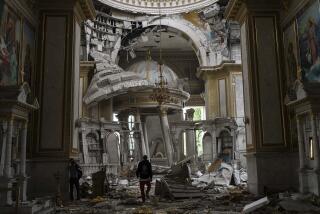33 killed in 3 Iraq car bombings
Three car bombs killed 33 people in Baghdad and the western Iraqi city of Fallouja on Sunday as people expressed anxiety over the country’s security situation.
Two car bombs ripped through the Iraqi capital almost simultaneously just after 10 a.m. The deadliest attack was in the Shiite Muslim neighborhood of Kadhimiya, where a suicide car bomb exploded outside an office of the state Ministry for National Security and left 19 dead and 53 wounded, according to police sources. The blast destroyed several homes and turned the prosperous neighborhood into a scene of mourning and rage.
A man who gave his name only as Majid described in a phone call people walking around in a daze. Some screamed “God is great!” in grief for the dead while others expressed anger at the country’s politicians. “God damn the government!” he heard one man shout in anger over what is widely seen as a deteriorating security situation.
“Why would they do security meetings in a place where residents live?” Majid asked, referring to rumors in the neighborhood that a meeting was taking place in the security office when the bombing took place.
The second car bomb exploded in the Mansour district in west Baghdad close to the office of the Asiacell phone company. The blast left people stumbling in a cloud of dust amid burning cars, according to accounts of survivors. At least 10 people were killed and 58 others were wounded, according to police sources.
A man who gave his name as Usama had been driving his Kia minibus when the blast lifted him off the ground. He scrambled out of his vehicle and darted down a side street as panicking security guards fired shots into the air. But he was soon helping load the wounded into ambulances.
“I’m mad at the situation, at the miserable security situation,” Usama said. “We just want to wake up in the morning and go to work like it’s a normal morning.”
Attacks have been on a steady increase since the inconclusive March 7 national elections as armed groups seek to exploit what they see as a political and security vacuum.
The country’s political leaders have been unable to form a new government and have witnessed a steady rise in violence as they continue to negotiate. The last major bombing in Baghdad occurred Sept. 5 when a group of suicide bombers attempted to storm the headquarters of the 11th Iraqi Army Division.
A third car bomb exploded Sunday in Fallouja, killing three soldiers and one policeman, a security officer said. The attack targeted an army patrol and came after a controversial raid last week by Iraqi and U.S. special forces, which left at least six people dead.
The U.S. military said that the raid had targeted a leader of the militant group Al Qaeda in Iraq and that the troops had come under fire. Residents said the raid had killed at least three young brothers. The operation prompted a street demonstration over the weekend in a sign of tension in the Sunni Arab city that had once been a bastion of the insurgency.
The bombings Sunday were the deadliest since President Obama declared an end to the U.S. combat operation Aug. 31. Some Iraqi politicians have started to blame the U.S. military for drawing down its forces to below 50,000. After Sunday’s bloodshed, Kurdish lawmaker Mahmoud Othman accused the Americans of disengagement.
“The Americans didn’t train our troops. They did not supply them with weapons as it must be and didn’t give them the necessary technology,” Othman told reporters. “I think there is a big dereliction by the Americans in this regard. They escaped from Iraq and left these problems.”
ned.parker@latimes.com
More to Read
Start your day right
Sign up for Essential California for news, features and recommendations from the L.A. Times and beyond in your inbox six days a week.
You may occasionally receive promotional content from the Los Angeles Times.






